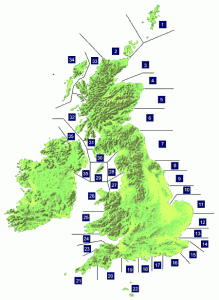Our network of volunteer observers began with a handful of enthusiasts in the 1970s and has grown to be one of the most important sources of cetacean sightings data in Europe!
Every coastal county of the UK has a Regional Co-ordinator, responsible for volunteer observers from all walks of life, who conduct timed watches throughout the year. This is one of the first “citizen science” projects of its type in the world and has led to the development of the largest cetacean sightings database in Europe! Over 3800 observers have been responsible for the 125,000 records in the database! This work was first established by our incredible Director Dr Peter Evans in the 1970s and as it developed led to the creation of Sea Watch Foundation in 1991. Anyone can take part in this work, you don’t need to be a scientist and in fact you can learn as you go. All you need is enthusiasm, a pair of binoculars and a little patience. If you spend time at sea or by the coast, or if you plan to visit the seaside, take time to look around and record what you see – and what you don’t! Support materials are available (free to Members) including a Cetacean ID Guide and video clips of key species. We run training courses including an in-depth two day course and shorter half- or full-day events which take place at various times and locations each year.
Any information on whales, dolphins and porpoises is useful to us, and we have an online form here for “casual” sightings. By far the most useful data though is that collected through “effort related” methods. It sounds very scientific but although incredibly valuable, is easily collected by the non-scientist. “Effort-related” data means that observers time their watch and collect environmental data every 15 minutes during the watch. There is no set time for a watch period as long as time, date and location are carefully noted. along with any sightings information. The optimum duration however is between one and two hours.
If you would like to become involved, our Sightings Officer, Chiara Bertulli, can advise and support you. Contact her here. Alternatively you can contact your Regional Co-ordinator. You will find their contact details, and further information, on the main Sea Watch website here.

